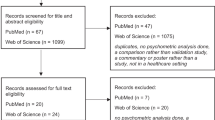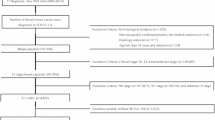Summary
There has been considerable interest in how doctors break bad news, with calls from within the profession and from patients for doctors to improve their communication skills. In order to aid clinical training and assessment of the skills used in breaking bad news there is a need for a reliable, practical and valid, structured rating schedule. Such a rating schedule was compiled from agreed criteria in the literature. Video-taped recordings of simulated consultations breaking bad news were independently assessed by three raters using the schedule and compared to three experts who gave global ratings. The primary outcome measures were internal consistency of the schedule and level of agreement between raters. The internal consistency was high with a Cronbach’s alpha of 0.93. Agreement between raters using the schedule was moderate to good. The majority of the variation in scores was due to the differences in skills demonstrated in the interviews. The agreement between raters not using the schedule was poor. The BAS provides a simple to use, reliable, and consistent rating schedule for assessing skills used in breaking bad news. It could be a valuable aid to teaching this difficult task.
Similar content being viewed by others
Article PDF
Change history
16 November 2011
This paper was modified 12 months after initial publication to switch to Creative Commons licence terms, as noted at publication
References
Bland, J. M. & Altman, D. G. (1997). Statistics notes. Cronbachs alpha. Br Med J 314: 572
Brennan, P. & Silman, A. (1992). Statistical methods for assessing observer variability in clinical measures. Br Med J 304: 1491–1494.
Brennan, P., Silman, A., Black, C., Bernstien, R., Coppock, J., Maddison, P., Sheeran, T., Stevens, C. & Wollheim, F. (1992). Reliability of skin involvement measures in scleroderma. Br J Rheumatol 31: 457–460.
Buckman, R. & Kason, Y. (1992). How to Break Bad News – a Protocol for Healthcare Professionals. Toronto University Press: Toronto
Burton, M. V. & Parker, R. W. (1997). Psychological aspects of cancer surgery: surgeons’ attitudes and opinions. Psycho-oncology 6: 47–64.
Butow, P. N., Dunn, S. M., Tattersall, M. H. N. & Jones, Q. J. (1995). Computer-based interaction analysis of the cancer consultation. Br J Cancer 71: 1115–1121.
Butow, P. N., Kazemi, J. N., Beeney, L. J., Griffin, A., Dunn, S. M. & Tattersall, M. H. N. (1996). When the diagnosis is cancer, patient communication experiences and preferences. Cancer 77: 2630–2637.
Butow, P. N., Maclean, M., Dunn, S. M., Tattersall, M. H. N. & Boyer, M. J. (1997). The dynamics of change: patients’ preferences for information, involvement and support. Ann Oncol 8: 857–863.
Cassileth, B. R., Zupkis, R. V., Sutton Smith, K. & March, V. (1980). Information and participation preferences among cancer patients. Annals of internal Medicine 92: 832–836.
Cushing, A. M. & Jones, A. (1995). Evaluation of a breaking bad news course for medical students. Med Edu 29: 430–435.
Eggly, S., Afonso, N., Rojas, G., Baker, M., Cardozo, L. & Robertson, R. S. (1997). An assessment of Residents’ competence in the delivery of bad news to patients. Acad Med 72: 397–399.
Fallowfield, L. J. (1993). Giving sad and bad news. Lancet 341: 476–478.
Fallowfield, L. J. (1995). Psychosocial interventions in cancer. Br Med J 311: 1316–1317.
Ford, S., Fallowfield, L. J. & Lewis, S. (1996). Doctor–Patient interactions in oncology. Soc Sci Med 42: 1511–1519.
Garg, A., Buckman, R. & Kason, Y. (1997). Teaching medical students how to break bad news. Can Med Assoc J 156: 1159–1164.
Gillard, J. H., Dent, T. H. S., Aarons, E. J., Crimlisk, H. L., Smyth-Piggot, P. J. & Nicholls, M. H. N. (1993). Preregistration houseofficers it the Thames regions: changes in quality of training after four years. Br Med J 307: 1176–1179.
Girgis, A., Sanson-Fisher, R. W. & McCarthy, W. H. (1997). Communicating with patients: Surgeons’ perceptions of their skills and need for training. Aust NZ J Surg 67: 775–780.
GMC (1993). Tomorrow’s Doctors. General Medical Council: London
Hamajima, N., Tajima, K., Morshita, M., Hyodo, C., Sakakibara, N., Kawai, C. & Moritaka, S. (1996). Patients’ expectations of information provided at cancer hospitals in Japan. Jpn-J-Clin-Oncol 26: 362–367.
Harrison, J., Maguire, P., Ibbotsen, T., Macleod, R. & Hopwood, P. (1994). Concerns, confiding and psychiatric disorder in newly diagnosed cancer patients: a descriptive study. Psycho-oncology 3: 173–179.
Kalet, A., Earp, J. & Kowlowitz, V. (1992). How well do faculty evaluate the interviewing skills of medical students. J Gen Intern Med 7: 499–505.
Lazarus, R. S. (1993). Coping theory and research: past, present and future. Psychosom Med 55: 234–247.
Loge, J. H., Kaasa, S. & Hytten, K. (1997). Disclosing the cancer diagnosis: the patients’ experiences. Eur J Cancer 33(6): 878–82.
Macleod, R. (1991). Patients with advanced breast cancer: the nature and disclosure of their concerns. MSc thesis, University of Manchester
Maguire, P. & Faulkner, A. (1988). Communicate with cancer patients: 1. Handling bad news and difficult questions. Br Med J 297: 907–909.
Maguire, P., Fairbairn, S. & Fletcher, C. (1986a). Consultation skills of young doctors: II Most young doctors are bad at giving information. Br Med J 292: 1576–1578.
Maguire, P., Fairbairn, S. & Fletcher, C. (1986b). Consultation skills of young doctors: 1. Benefits of feedback training in interviewing as students persist. Br Med J 292: 1573–1576.
Noel, G. L., Hebers, J. E., Caplow, M. P., Cooper, G. S., Pangaro, L. N. & Harvey, J. (1992). How well do internal medicine faculty members evaluate the clinical skills of residents?. Ann Int Med 117: 757–765.
Parle, M., Jones, B. & Maguire, P. (1996). Maladaptive coping and effective disorders among cancer patients. Psychol Med 26: 735–744.
Ptacek, J. T. & Eberhardt, T. L. (1996). Breaking bad news. A review of the literature. JAMA 276: 496–502.
Royal College of Physicians (1997). College Report: Improving communication between doctors and patients. J R Coll Phys Lond 3: 258–259.
Sell, L., Devlin, B., Bourke, S. J., Munro, N. C., Corris, P. A. & Gibson, G. J. (1993). Communicating the diagnosis of lung cancer. Respir Med 87: 61–63.
Stewart, M. A. (1995). Effective physician communication and health outcomes: a review. Can Med Assoc J 152: 1423–1433.
Author information
Authors and Affiliations
Rights and permissions
From twelve months after its original publication, this work is licensed under the Creative Commons Attribution-NonCommercial-Share Alike 3.0 Unported License. To view a copy of this license, visit http://creativecommons.org/licenses/by-nc-sa/3.0/
About this article
Cite this article
Miller, S., Hope, T. & Talbot, D. The development of a structured rating schedule (the BAS) to assess skills in breaking bad news. Br J Cancer 80, 792–800 (1999). https://doi.org/10.1038/sj.bjc.6690423
Received:
Revised:
Accepted:
Published:
Issue date:
DOI: https://doi.org/10.1038/sj.bjc.6690423
Keywords
This article is cited by
-
Development and preliminary evaluation of a communication skills training programme for hospital physicians by a specialized palliative care service: the ‘Teach to Talk’ programme
BMC Medical Education (2020)
-
Social worker assessment of bad news delivery by emergency medicine residents: a novel direct-observation milestone assessment
Internal and Emergency Medicine (2016)
-
Counseling for personal care options at neonatal end of life: a quantitative and qualitative parent survey
BMC Palliative Care (2015)
-
The Influence of Distress on Knowledge Transfer for Men Newly Diagnosed with Prostate Cancer
Journal of Cancer Education (2012)
-
Überbringen schlechter Nachrichten in der ärztlichen Praxis
Monatsschrift Kinderheilkunde (2011)



